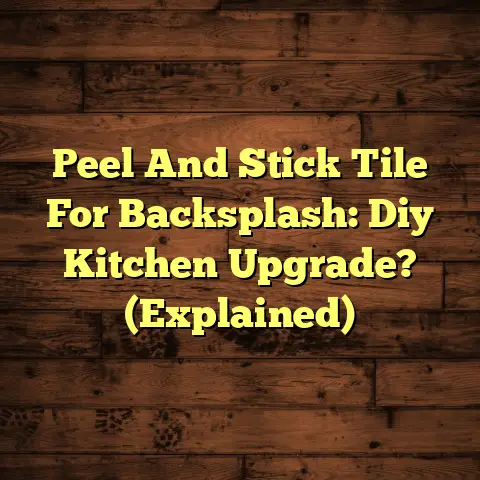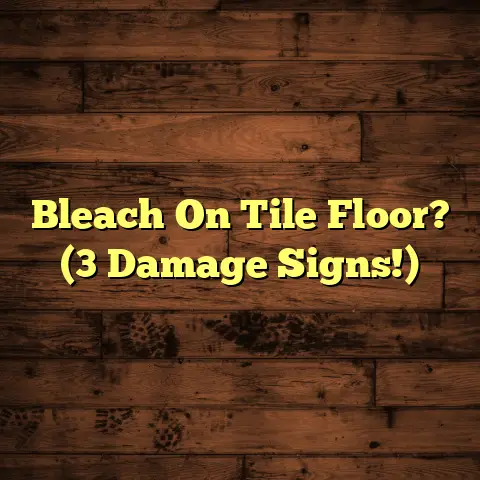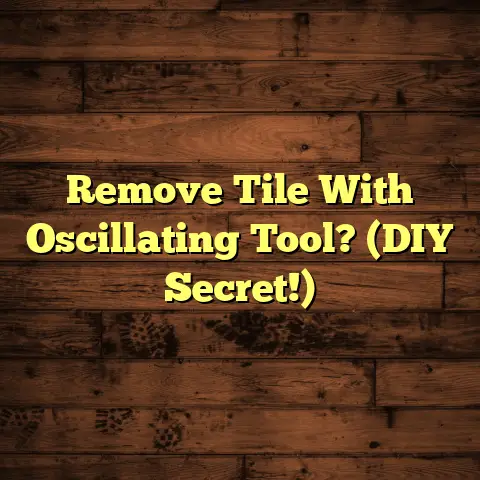Garage Floor Coatings: How Long? (1 Yr Killer!)
And let me tell you, I’ve seen it all – from garages that look like operating rooms to those that resemble a monster truck rally aftermath.
One thing I’ve learned is that a good garage floor coating can make or break the space.
It’s not just about looks, it’s about functionality, durability, and, if you’re like me, keeping those furry family members happy and safe.
If you’re a pet owner, you know the unique challenges they bring to any flooring situation.
Scratches, spills, accidents… it’s a constant battle!
That’s why choosing the right garage floor coating is crucial, not just for aesthetics but for longevity and ease of cleaning.
But here’s the kicker: not all coatings are created equal.
Some promise the world and deliver… well, let’s just say they end up cracking under pressure – literally!
That’s why I’m here to talk about the dreaded “1 Yr Killer” – those coatings that fail miserably within a year.
I’ll help you navigate the options, understand the pitfalls, and choose a coating that will last, even with your beloved pets running the show.
Let’s dive in!
Section 1: Understanding Garage Floor Coatings
So, what exactly is a garage floor coating?
Simply put, it’s a protective layer applied over your concrete floor to enhance its appearance and durability.
Think of it as a shield against oil spills, tire marks, chemical stains, and, of course, the wear and tear from your four-legged companions.
There are several types of coatings available, each with its own pros and cons.
Let’s break down the most common ones:
-
Epoxy: This is probably the most well-known type. It’s a two-part system that creates a hard, durable finish. Epoxy is resistant to chemicals, abrasion, and impact. However, it can be susceptible to hot tire pickup (where the coating softens and sticks to hot tires) and can become slippery when wet.
-
Polyurethane: Often used as a topcoat over epoxy, polyurethane offers excellent UV resistance and flexibility. This means it’s less likely to crack or fade in sunlight and can better withstand temperature fluctuations. Polyurethane is also more resistant to scratches than epoxy.
-
Polyaspartic: This is the new kid on the block, and it’s gaining popularity fast. Polyaspartic coatings are incredibly durable, fast-drying, and resistant to a wide range of chemicals and abrasions. They also have excellent UV resistance and can be applied in a wider range of temperatures than epoxy. The downside? They tend to be more expensive.
-
Acrylic: Acrylic coatings are typically water-based and offer a more economical option. They are easy to apply and provide a decent level of protection. However, they are not as durable or chemical-resistant as epoxy or polyurethane.
-
Concrete Sealers: These are penetrating sealers that soak into the concrete, providing a level of protection against moisture and stains. They don’t offer the same level of abrasion resistance as coatings, but they can be a good option for those on a budget.
Now, let’s talk about pet-friendly coatings.
What makes a coating “pet-friendly?”
Well, it boils down to a few key factors:
-
Non-toxicity: The coating should be free of harmful chemicals that could leach out and be ingested by your pets.
-
Easy cleanup: Accidents happen! The coating should be easy to clean and resistant to stains from urine, vomit, and other pet-related messes.
-
Scratch resistance: Those claws can do some serious damage! The coating should be able to withstand scratches from your pets’ nails.
-
Slip resistance: A slippery floor can be dangerous for pets, especially older ones. Look for coatings with a textured finish or consider adding a non-slip additive.
Section 2: The Importance of Pet-Friendly Choices
As a pet owner myself, I understand the unique challenges they bring to homeownership.
Those adorable furry faces can wreak havoc on your floors!
Let’s face it, garages aren’t exactly known for being the cleanest spaces.
They’re often home to oil spills, antifreeze leaks, and a whole host of other potential hazards.
Now, add pets to the mix, and you’ve got a recipe for disaster if you don’t choose the right flooring.
Here’s a breakdown of the common issues pets can cause on garage floors:
-
Scratches: This is probably the most common problem. Those claws can leave unsightly scratches on your floor, especially if your pets like to dig or scratch at the surface.
-
Stains: Accidents happen, and pet urine can be particularly damaging to concrete. It can penetrate the surface, causing stains and odors that are difficult to remove.
-
Odors: Even if you clean up accidents promptly, lingering odors can be a problem. Concrete is porous, so it can absorb odors over time.
-
Chemical Exposure: Garages often contain harmful chemicals, such as oil, antifreeze, and cleaning products. Pets can accidentally ingest these substances if they lick or walk through them, leading to serious health problems.
So, what are the benefits of using pet-friendly coatings?
Let’s take a look:
-
Safety: Pet-friendly coatings are typically non-toxic, so you don’t have to worry about your pets being exposed to harmful chemicals.
-
Easy Cleanup: These coatings are designed to be easy to clean, making it a breeze to wipe up spills and accidents.
-
Odor Resistance: Many pet-friendly coatings are formulated to resist odors, preventing your garage from smelling like a kennel.
-
Durability: These coatings are typically more durable than standard coatings, so they can withstand the wear and tear from your pets’ activities.
-
Aesthetics: Let’s be honest, a clean and well-maintained garage looks better! Pet-friendly coatings can help keep your garage looking its best, even with pets around.
Think about it this way: investing in a pet-friendly coating is like buying insurance for your garage floor.
It protects your investment and ensures that your garage remains a safe and clean space for both you and your furry friends.
Section 3: Longevity of Garage Floor Coatings
Alright, let’s get down to the nitty-gritty: how long can you expect your garage floor coating to last?
The answer, unfortunately, is “it depends.”
Several factors can affect the lifespan of your coating, including:
-
Type of Coating: As we discussed earlier, different types of coatings have different levels of durability. Epoxy, for example, typically lasts 2-5 years, while polyaspartic can last 10 years or more.
-
Climate: Extreme temperatures and humidity can take a toll on your coating. In areas with harsh winters, for example, the freeze-thaw cycle can cause cracking and peeling.
-
Usage: How heavily you use your garage will also affect the lifespan of your coating. If you’re constantly driving heavy vehicles in and out, or if you use your garage as a workshop, your coating will likely wear out faster.
-
Maintenance: Regular cleaning and maintenance can significantly extend the lifespan of your coating. Neglecting your floor can lead to premature wear and tear.
Now, let’s talk about the “1 Yr Killer.”
What does that mean?
Well, it refers to those coatings that fail within a year of application.
This can be due to a number of factors, including:
-
Poor Preparation: This is probably the most common cause of coating failure. If the concrete surface isn’t properly prepared, the coating won’t adhere properly and will eventually peel or flake off.
-
Incorrect Application: Applying the coating incorrectly can also lead to premature failure. This includes using the wrong mixing ratios, applying the coating too thinly, or not allowing it to cure properly.
-
Low-Quality Materials: Using cheap, low-quality materials is another recipe for disaster. These coatings simply aren’t durable enough to withstand the rigors of a garage environment.
-
Moisture Issues: Moisture trapped beneath the coating can cause it to blister and peel. This is especially common in garages with poor drainage or high humidity.
But what about pets?
How do they contribute to the “1 Yr Killer” phenomenon?
Well, their accidents can be particularly damaging to coatings that aren’t properly sealed or resistant to chemicals.
Urine, for example, can penetrate the coating and damage the concrete beneath, leading to staining and odors.
Here’s a story from my experience:
I once had a client who insisted on using a cheap epoxy coating in his garage, despite my warnings.
He had two large dogs who spent a lot of time in the garage, and within six months, the coating was peeling and stained from their accidents.
He ended up having to pay me to remove the old coating and install a new, pet-friendly polyaspartic system.
It was a costly mistake that could have been avoided with proper planning and a quality coating.
Here’s a table that summarizes the expected lifespan of different types of garage floor coatings:
| Coating Type | Expected Lifespan | Pros | Cons |
|---|---|---|---|
| Epoxy | 2-5 years | Durable, chemical-resistant, relatively inexpensive | Susceptible to hot tire pickup, can be slippery when wet |
| Polyurethane | 5-10 years | UV resistant, flexible, scratch-resistant | Can be more expensive than epoxy |
| Polyaspartic | 10+ years | Extremely durable, fast-drying, chemical-resistant, UV resistant | Most expensive option |
| Acrylic | 1-3 years | Inexpensive, easy to apply | Not as durable or chemical-resistant as other options |
| Concrete Sealer | 1-2 years | Inexpensive, easy to apply | Doesn’t offer the same level of abrasion resistance as coatings |
Source: Based on my 15+ years of experience and industry standards.
As you can see, the lifespan of your garage floor coating can vary widely depending on the type of coating and the conditions it’s exposed to.
Investing in a quality coating and proper maintenance is crucial to ensuring that your floor lasts for years to come.
Section 4: Maintenance Tips for Pet Owners
Okay, you’ve chosen a great pet-friendly coating. Now what?
Maintenance is key to extending its lifespan and keeping your garage looking its best.
Here are some practical tips for pet owners:
-
Clean up accidents immediately: This is the most important thing you can do. The longer urine or vomit sits on the floor, the more likely it is to stain or damage the coating. Use a pet-specific enzymatic cleaner to neutralize odors and prevent your pets from returning to the same spot.
-
Sweep or vacuum regularly: This will remove dirt, debris, and pet hair that can scratch or damage the coating.
-
Mop regularly: Use a mild detergent and water to mop your garage floor at least once a month. Avoid using harsh chemicals or abrasive cleaners, as these can damage the coating.
-
Use floor mats: Place floor mats in high-traffic areas, such as near the entrance to your house or under your pets’ food and water bowls. This will help protect the coating from scratches and spills.
-
Trim your pets’ nails regularly: This will help minimize scratches on your floor.
-
Inspect the floor regularly: Look for signs of wear and tear, such as cracks, chips, or peeling. Address minor issues promptly to prevent them from escalating.
-
Re-coat as needed: Depending on the type of coating you have, you may need to re-coat it every few years to maintain its protection.
Here are some recommended cleaning products for pet owners:
-
Enzymatic cleaners: These cleaners contain enzymes that break down the organic compounds in pet urine and vomit, neutralizing odors and preventing staining.
-
Mild detergents: Use a mild detergent and water to mop your garage floor regularly.
-
Concrete degreasers: These products are designed to remove oil and grease stains from concrete.
Important Note: Always test cleaning products in an inconspicuous area before applying them to the entire floor.
Here’s a simple cleaning routine you can follow:
-
Sweep or vacuum the floor to remove loose dirt and debris.
-
Mix a mild detergent with water in a bucket.
-
Mop the floor with the detergent solution.
-
Rinse the floor with clean water.
-
Dry the floor with a clean towel or allow it to air dry.
By following these simple maintenance tips, you can keep your garage floor looking its best and extend the lifespan of your coating, even with pets around.
Section 5: Choosing the Right Coating for Your Garage
Alright, so you’re ready to take the plunge and coat your garage floor.
But with so many options available, how do you choose the right one?
Here are some factors to consider:
-
Lifestyle: How do you use your garage? Is it just for parking cars, or do you also use it as a workshop or storage space? If you use your garage heavily, you’ll need a more durable coating.
-
Pet Type: What kind of pets do you have? Do you have large dogs who are prone to scratching, or smaller pets who are less likely to cause damage?
-
Garage Usage: How much time do your pets spend in the garage? If they spend a lot of time there, you’ll need a coating that is resistant to stains and odors.
-
Budget: How much are you willing to spend on your garage floor coating? Keep in mind that the cheapest option isn’t always the best value. Investing in a quality coating can save you money in the long run by preventing premature failure.
Here’s a comparison of the pros and cons of various pet-friendly coatings:
| Coating Type | Pros | Cons |
|---|---|---|
| Epoxy | Relatively inexpensive, durable, chemical-resistant, can be made slip-resistant with additives | Susceptible to hot tire pickup, can be slippery when wet, may require a topcoat for UV resistance |
| Polyurethane | UV resistant, flexible, scratch-resistant, can be applied over epoxy, good chemical resistance | Can be more expensive than epoxy, may require professional installation |
| Polyaspartic | Extremely durable, fast-drying, chemical-resistant, UV resistant, can be applied in a wider range of temperatures, excellent abrasion resistance | Most expensive option, may require professional installation |
| Acrylic | Inexpensive, easy to apply, water-based, low VOCs | Not as durable or chemical-resistant as other options, may require multiple coats |
| Concrete Sealer | Inexpensive, easy to apply, penetrates the concrete to provide protection against moisture and stains | Doesn’t offer the same level of abrasion resistance as coatings, may require reapplication every year or two |
Expert Tip: When choosing a coating, look for products that are specifically labeled as “pet-friendly” or “low-VOC.” These products are less likely to contain harmful chemicals that could be harmful to your pets.
Here’s a real-life example:
I recently worked with a client who had a garage that was constantly being stained by her dog’s urine.
She had tried everything to clean it, but nothing seemed to work.
I recommended a polyaspartic coating because of its excellent chemical resistance and durability.
She was hesitant at first because of the cost, but she eventually decided to go for it.
A year later, she called me to tell me how happy she was with the coating.
The stains were gone, and the floor looked brand new.
She said it was the best investment she had ever made.
When it comes to budget considerations, it’s important to remember that you get what you pay for.
While a cheaper coating may seem like a good deal at first, it could end up costing you more in the long run if it fails prematurely.
Investing in a quality coating can save you money by preventing the need for costly repairs or replacements.
Section 6: Conclusion
So, there you have it – a comprehensive guide to garage floor coatings, with a special focus on pet-friendly options.
Choosing the right coating is crucial for enhancing the functionality, durability, and aesthetics of your garage, especially if you have pets.
Remember, not all coatings are created equal.
Some may fail within a year, leaving you with a mess and a headache.
By understanding the different types of coatings, the factors that affect their longevity, and the importance of proper maintenance, you can make an informed decision and choose a coating that will last for years to come.
Investing in a durable, pet-friendly option is a smart move that will protect your investment and ensure that your garage remains a safe and clean space for both you and your furry friends.
Don’t let your garage floor become a victim of the “1 Yr Killer.”
Take the time to assess your current flooring, consider your needs and budget, and choose a coating that meets your specific requirements.
Ready to upgrade your garage floor?
Take action today and start researching your options.
Talk to a professional flooring contractor, get quotes from different companies, and choose a coating that will transform your garage into a space you can be proud of.
Your pets (and your garage floor) will thank you for it!





